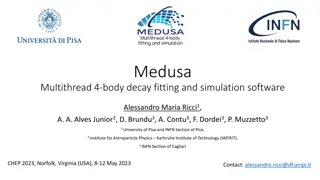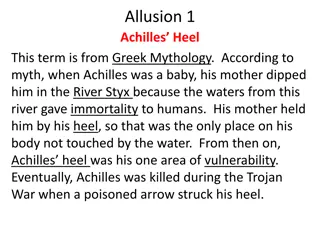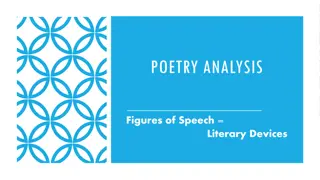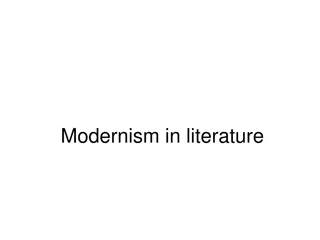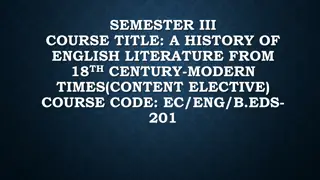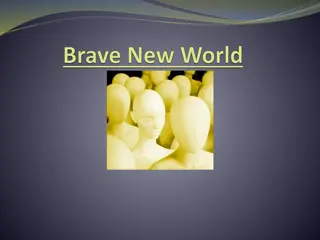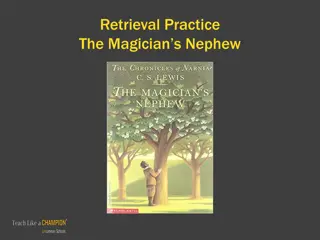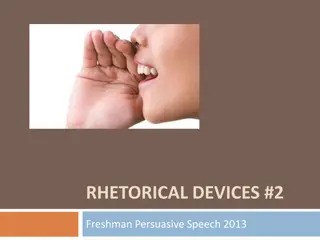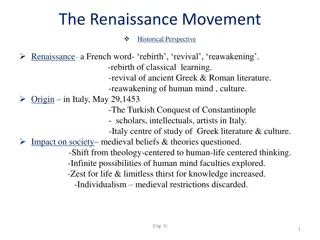Exploring Allusions in Literature: Medusa, Doublespeak, and More
Uncover the fascinating world of literary allusions through iconic references such as Medusa in Greek mythology, the concept of doublespeak from George Orwell's novel 1984, the phrase "hoist with one's own petard," being "over a barrel," and the famous Murphy's Law. Dive into the rich history and meanings behind these allusions that have shaped literature and language.
Download Presentation

Please find below an Image/Link to download the presentation.
The content on the website is provided AS IS for your information and personal use only. It may not be sold, licensed, or shared on other websites without obtaining consent from the author. Download presentation by click this link. If you encounter any issues during the download, it is possible that the publisher has removed the file from their server.
E N D
Presentation Transcript
Allusions 2ndNine Weeks
#1 Medusa In Greek mythology, Medusa was one of the Gorgons who, like her sisters, had snakes for hair and the power to turn anyone who looked at her to stone. Medusa, the only mortal one of the sisters, was killed by Perseus, who cut off her head. Medusa refers to a terrifying person who can freeze someone. Examples: He stared at the wreck on the highway as if he had looked at Medusa. I thought Medusa had looked at you and that you were turning to stone.
#2 Doublespeak In his novel 1984, George Orwell used the term doublespeak to refer to a type of propaganda practiced by the state in which language is used ambiguously. For instance, t he Defense Department was called the Ministry of Peace. Doublespeak refers to the deliberate use of evasive or ambiguous language. Examples: The company president stated that they were reducing costs, but the employees knew that was doublespeak for cutting peoples' salaries. The Japanese called their method of questioning POWs enhanced interrogation ; however, no amount of doublespeak could hide that they were really torturing the prisoners.
#3 Hoist with one s own petard A petard was a weapon used in medieval warfare. It was a bell shaped object that was milled with gunpowder and then hoisted, or lifted, onto gates or walls to blow them up. If the petard exploded prematurely the person using it would be blown up, or hoist with his own petard. This phrase refers to being caught in one s own trap or beaten at one s own game. Examples: She intended to murder her brother but was hoist with her own petard when she ate the poisoned food intended for him. The vandals were hoist with their own petard when they tried to make an emergency call from the pay phone they had broken.
#4 Over a Barrel This is an American phrase and first appeared in the mid-20th century. It is supposed that it alludes to the actual situation of being draped over a barrel, either to empty the lungs of someone who has been close to drowning, or to give a flogging. Either way, the position of helplessness and in being under someone else's control is what is being referred to. Someone is said to be over a barrel when he or she is unable to act independently and must do the bidding of someone else. Examples: Once the competitors found a flaw in our product, they had us over a barrel. The software company has you over a barrel if you don't accept the license, you can't use the software.
#5 Murphy s Law The original Murphy's Law was "If there are two or more ways to do something, and one of those ways can result in a catastrophe, then someone will do it." The law's author was Edward A. Murphy, Jr., a U.S. Air Force engineer, who, in 1947, was involved in a rocket-sled experiment in which all 16 accelerator instruments were installed in the wrong way, resulting in Murphy's observation. Murphy's Law is sometimes expressed as "Anything that can go wrong, will -- at the worst possible moment. Murphy s Law refers to the fact that errors are inevitable. Examples: If you perceive that there are four possible ways in which a procedure can go wrong, and circumvent these, then a fifth way, unprepared for, will promptly develop. If everything seems to be going well, you have obviously overlooked something.
#6 Shibboleth This is a Hebrew word for an ear of corn. In the Old Testament, the Israelites used this as a password to prevent their enemies, who mispronounced the word shibboleth, from infiltrating their camp. A shibboleth has come to mean a slogan or catchword used by, or associated with, a particular party, group, or sect. Examples: She repeated the old shibboleth that time heals all wounds. We knew that their claim of giving the best deal in town was just a shibboleth.
#7 Philistines/Philistinism In the Old Testament, the Philistines were enemies of the Israelites. In a famous Biblical story, David successfully fought the giant Philistine warrior, Goliath. In modern usage, philistine refers to a person with no appreciation for culture and whose tastes are commonplace. Such an attitude is referred to as philistinism. Examples Sandra was pleasantly surprised when her boyfriend surprised her with tickets to the opera; she often teased him about being a philistine whose idea of culture was an evening of watching wrestling on television. The artist was appalled at the philistinism of those attending his gallery show; rather than appreciating his work, many of them seemed most concerned about whether a particular painting would match their sofa.
#8 Faust/Faustian Bargain Faust is the subject of plays by Christopher Marlowe, (Dr. Faustus) and Goethe (Faust). In both dramas, Faust strikes a bargain with Mephistopheles, or the devil. In Marlowe s play, Faust sells his soul in exchange for twenty four years in which he can have everything he desires. In Goethe s version, Faust becomes the servant of Mephistopheles, again in exchange for having all his desires fulfilled. In both cases, Faust spends much of his time in despair. A Faustian bargain refers to sacrificing one s self or one s values in exchange for getting one s desires, often material wealth. Examples: In the famous Chicago Black Sox scandal of 1919, some of the baseball players struck a Faustian bargain with gamblers, agreeing to lose the World Series intentionally in exchange for a monetary payoff. The film director felt like Faust when the studio told him they would not release his fil unless he changed the ending to a happy one that audiences would prefer. He had to decide whether to sacrifice his artistic integrity for the sake of the fortune he knew the movie would bring him.
#9 Coals to Newcastle Newcastle is a coal-mining city in Northern England. Thus, carrying coals to Newcastle would be completely superfluous. The phrase refers to giving a superfluous gift or making a contribution that is gratuitous and unnecessary. Examples: Although putting one more pair of shoes into her closet was like carrying coals to Newcastle, Veronica could not resist the sale, and she ended up buying three new pairs. When I saw her kitchen shelf overflowing with seemingly every cookbook ever written, I realized that the hostess gift I had brought her was a case of coals to Newcastle.
#10 Freudian Slip Sigmund Freud was an Austrian physician and psychotherapist whose work centered around the role of the subconscious mind in human behavior. The term Freudian slip comes from Freud. A Freudian slip is an unintentional or accidental error, either in speech or action that apparently reveals one s subconscious thoughts or desires. Examples: In an old cartoon in The New Yorker magazine, a king sits on his throne and, when the queen enters the room, says, Good morning beheaded, er beloved! Of course, the reader recognizes this as a Freudian slip. The teacher realized that forgetting to bring home the stack of papers to grade was probably a Freudian slip resulting from her desire to have the weekend to devote solely to relaxation.
#11 Sisyphus/Sisyphean In Greek mythology, Sisyphus was a king who offended Zeus. His punishment was to spend eternity in Hades, rolling a giant boulder up a hill. Each time the boulder neared the top, it would roll back down to the bottom, and Sisyphus had to start his task over. A seeming endless, perhaps futile task can be referred to as a labor of Sisyphus or as Sisyphean. Examples: Painting the Golden Gate bridge is a Sisyphean task. Once the bridge is completely painted, it is time to begin painting it again at the beginning, so the painting never ends. My mother did not buy my argument that making my bed each morning was basically a labor of Sisyphus since the bed was only going to be unmade again in the evening and that therefore I should not be expected to do it.
#12 Methuselah Methuselah is the oldest of the patriarchs in the Bible. He lived to be 969 years old. The term Methuselah has come to be used proverbially to refer to an extremely old person. Examples: From the teenagers point of view, it was ridiculous that only thirty-five-year-old Methuselahs could afford the sports cars they would love to be driving. If I live to be as old as Methuselah, I will never understand how that horrible film was nominated for an Academy Award.
#13 Holy Grail In Medieval legend, the Holy Grail was a object of quest. It was supposedly the cup from which Jesus drank at the Last Supper. The grail became associated with the legends of King Arthur and the Knights of the Round Table. For the knights, the Holy Grail represented perfection and was constantly sought after. A Holy Grail is an object that is extremely desirable or valuable and which is attainable only after a long and difficult quest. Examples: For teams in the National Hockey League, the Stanley Cup is the equivalent of the Holy Grail. In The Great Gatsby, Daisy Buchanan is the Holy Grail for Jay Gatsby, which is ironic because Daisy is actually rather childish and shallow, hardly the perfect creature Gatsby considers her to be.
#14 Luddites Luddites were British laborers in the early 1800s. They opposed industrialization, fearing that the introduction of labor-saving machinery would threaten their jobs. Their leader, for whom they were named, was a laborer named Ned Ludd. With his encouragement, the workers smashed textile machinery in protest of industrialization. A Luddite is someone who opposes change, especially industrial or technological advances. The word Luddite can also be used as an adjective (for example, a Luddite point of view ). Examples: I m not a Luddite or anything, but I miss the days of receiving handwritten letters in the mail. Now it seems that all correspondence is conducted via email. The boss s Luddite resistance to updating the company s ancient telephone system was a constant source of frustration to his employees.
#15 Pass the Buck In poker, a buck was a marker that was passed to the person whose turn it was to deal. President Harry Truman kept a sign on his desk which read The Buck Stops Here. To pass the buck is to shift responsibility (and often blame) to another person. Thus, President Truman s sign meant that he was willing to accept the ultimate responsibility for matters of concern to the country and would not try to pass that responsibility to others or to blame others for problems in the country. Examples: Rather than face the angry crowd herself, the mayor passed the buck to a spokesperson, who then had to try to appease the citizens and respond to their questions and complaints. I tried to pass the buck for not completing my homework assignment by telling my teacher that my best friend really needed to talk to me on the phone until late last night, but my teacher didn t consider that to be a legitimate excuse.
#16 Babylon Babylon was the capital of the ancient Babylonian Empire. The city was known for its luxury and corruption. The Jews were exiled there from 597 to 538 B.C.E., and the prophet Daniel interpreted the handwriting on the wall. Eventually, the Jews were allowed to return to Israel. Babylon refers to a place of decadence and corruption. Examples: Coming from a small Midwestern farming community, Jeff felt as if he had arrived in Babylon when he encountered the sights and sounds of nightlife in New York City. I tried to reassure my parents that I was only going off to a university, not to Babylon, but they seemed to think the two were synonymous.
#17Phoenix/Rising from the Ashes The phoenix was mythological bird that was one of a kind. The bird lived for five or six hundred years, after which it would burn itself to death and then rise from its own ashes as a youthful bird ready to live another life span. The phoenix has come to symbolize rebirth or resurrection and rising from the ashes can describe surmounting great obstacles. Examples: After successfully battling cancer, Stuart Scott came back, phoenix-like, to be active TV anchor who is also a motivational advocate of cancer awareness on Twitter, regularly retweeting and sending praise to those who reach out to him about how cancer has affected their lives. Despite several box office failures, the actress was able to rise from the ashes, and she is now one of Hollywood s top paid performers.
#18 Xanadu Xanadu was an ancient city in Mongolia where the Mongol emperor of China, Kublai Khan had a magnificent residence. Xanadu was made famous by the poem Kubla Khan (1816) by Samuel Taylor Coleridge. The first lines of Coleridge s poem are: In Xanadu did Kubla Khan/ A stately pleasure-dome decree. Xanadu refers to any magnificent, beautiful, almost magical place. Examples: Newspaper magnate William Randolph Hearst created hos own version of Xanadu in San Simeon, California an estate that included a zoo, an airport, a theater, numerous guesthouses, and countless works of art. Broadway is Xanadu to all the struggling actors who make ends meet by waiting tables or driving taxis while they wait for their big break in the theater.
#19 Muckrakers President Theodore Roosevelt criticized reform-minded journalists of his time, saying they constantly focused on the muck and spent all their time raking it up. While he meant this as an insult, the journalists adopted the term muckraker as a badge of honor referring to those who exposed corruption or promoted needed reforms. Upton Sinclair s The Jungle is a prime example of muckraking journalism. Muckraker is a term applied to authors or journalists who expose corruption in government, business, or other arenas. Examples: In the early 1970s, two muckraking journalists exposed the Watergate scandal and brought an end to a presidency. Fancying themselves modern-day muckrakers, the staff of the school newspaper decided to investigate conditions in the school cafeteria s kitchen.
#20 Sine qua non In Latin, the phrase means without which, nothing. Sine qua non refers to the essential ingredient without which an endeavor or situation would be impossible. Examples: The older voters support of the bond issue is the sine qua non. Since they are in the majority, their votes will decide whether or not the bond passes. Zara s optimistic attitude is the sine qua non of our team s success; she keeps the rest of us inspired even when we feel like giving up.
#21 Scylla and Charybdis In Greek mythology, Scylla was a , many-headed monster living in a cave on a narrow strait. Charybdis was a whirlpool living on the opposite side of the strait. Sailors, including Odysseus and Jason, had to steer their ships very carefully between the two in order to avoid being victim to one or the other. Between Scylla and Charybdis means to be caught between two equal dangers in which avoiding one means getting closer to the other. The phrase has the same meaning as between a rock and a hard place. Examples: As she stood there, between Scylla and Charybdis, she did not know if she should speak the truth or tell her boss what he wanted to hear. If Eric did not stop skipping school and failing his classes, he would soon be between Scylla and Charybdis in terms of graduating with his class.




